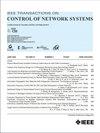Resilient Adaptive Stabilization for Nonlinear CPSs Dealing With Deception Attacks
IF 4
3区 计算机科学
Q2 AUTOMATION & CONTROL SYSTEMS
引用次数: 0
Abstract
It is still an open problem to output feedback stabilization with input quantizations and deception attacks for nonlinear cyber-physical systems subject to mismatched parametric uncertainties via backstepping design. This is because: first, the system contains mismatched uncertainties; second the output is corrupted by an additional attack signal, making the conventional recursive control design strategy using traditional error surfaces unsuitable; and third, since only the compromised output signal is available, the impacts of nonlinear items related to unknown attack weights become difficult to be explicitly addressed in the existing available output feedback control results. In this article, we present a solution to circumvent these obstacles by constructing a set of new应对欺骗攻击的非线性 CPS 的弹性自适应稳定技术
对于参数不匹配不确定的非线性网络物理系统,采用反步设计实现输入量化的输出反馈镇定和欺骗攻击仍然是一个有待解决的问题。这是因为:首先,系统中存在不匹配的不确定性;其次,输出被附加的攻击信号破坏,使得传统的递归控制设计策略不适合使用传统的误差面;第三,由于只有受损的输出信号是可用的,与未知攻击权重相关的非线性项的影响很难在现有的可用输出反馈控制结果中明确解决。在本文中,我们提出了一种解决方案,通过构造一组仅使用受损输出的新$K$滤波器来绕过这些障碍,该滤波器与涉及受攻击输出和滤波器变量的坐标变换一起,允许开发一种基于状态观测器的新形式的弹性自适应控制方案。同时,在实控制器中引入新的补偿项,消除了量化对系统稳定性的影响。结果表明,通过适当地建立Lyapunov函数,系统的原始输出收敛于零,并且闭环系统中的所有信号都是全局一致有界的。通过实例验证了所提策略的有效性。
本文章由计算机程序翻译,如有差异,请以英文原文为准。
求助全文
约1分钟内获得全文
求助全文
来源期刊

IEEE Transactions on Control of Network Systems
Mathematics-Control and Optimization
CiteScore
7.80
自引率
7.10%
发文量
169
期刊介绍:
The IEEE Transactions on Control of Network Systems is committed to the timely publication of high-impact papers at the intersection of control systems and network science. In particular, the journal addresses research on the analysis, design and implementation of networked control systems, as well as control over networks. Relevant work includes the full spectrum from basic research on control systems to the design of engineering solutions for automatic control of, and over, networks. The topics covered by this journal include: Coordinated control and estimation over networks, Control and computation over sensor networks, Control under communication constraints, Control and performance analysis issues that arise in the dynamics of networks used in application areas such as communications, computers, transportation, manufacturing, Web ranking and aggregation, social networks, biology, power systems, economics, Synchronization of activities across a controlled network, Stability analysis of controlled networks, Analysis of networks as hybrid dynamical systems.
 求助内容:
求助内容: 应助结果提醒方式:
应助结果提醒方式:


